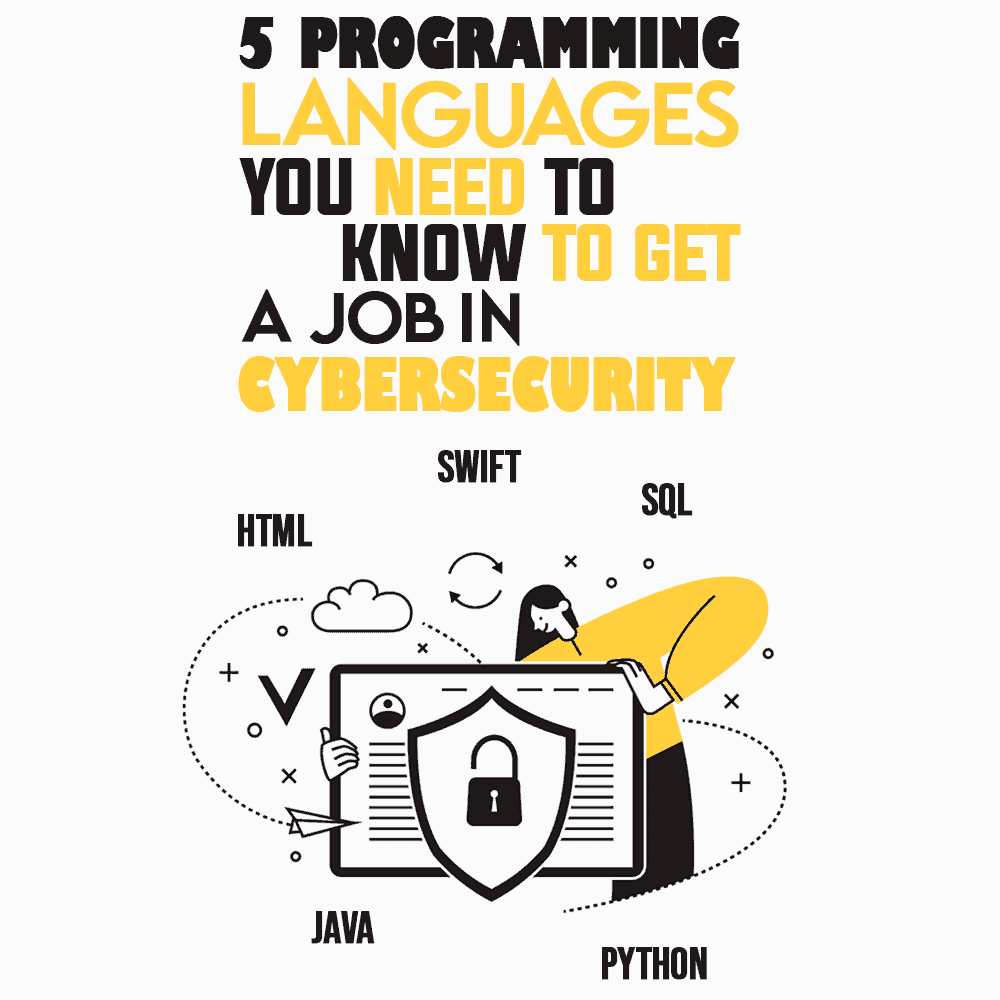 Even after advancements in security technologies, cybercrimes are still ever-growing. According to a statistic, cybercrimes are costing businesses about $2.9 million every minute. It is mainly because new technologies are regularly emerging, making it difficult to maintain security. With the increase in cyber threats, the cybersecurity field has become one of the most aspiring career choices among undergraduate students.
Even after advancements in security technologies, cybercrimes are still ever-growing. According to a statistic, cybercrimes are costing businesses about $2.9 million every minute. It is mainly because new technologies are regularly emerging, making it difficult to maintain security. With the increase in cyber threats, the cybersecurity field has become one of the most aspiring career choices among undergraduate students.
To successfully build a career in cybersecurity as a programmer, you will need to gain basic-to-intermediate-level skills in certain programming languages. Knowing these particular languages will help you quickly discover security vulnerabilities in almost any system and provide instant solutions.
And since most cyberattacks are carried out by modifying the codes of genuine applications or websites, a good knowledge of coding will help you in finding loopholes and fixing the altered codes. In addition, you will also have the confidence to successfully tackle the hacking attempts on any organization.
In this post, I will list the top programming languages you should learn to enter the cybersecurity field.
HTML
Although many professional coders and programmers might not consider HTML as a programming language, a knowledge of HTML is essential if you aspire to become a cybersecurity expert. Almost every modern and traditional website is coded in HTML, and it is evident that virtually every cyberattack is initiated through a website.
Cyberattackers primarily use HTML to infuse malicious code into webpages and conduct web-scripting attacks. Phishing is also performed by manipulating HTML code and luring the users into fraudulent offers. Using HTML, cybercriminals create a spoof of genuine websites and illicitly gain the login credentials of the victims. Knowledge of HTML will help you in detecting spoof websites and prevent phishing attempts executed through malicious webpages.
JavaScript
The core functionality of a website is defined through the JavaScript language. It is one of the most popular languages for coders in today’s world. More than 97% of all websites use JavaScript as the client side programming language. When you visit any website, the pop-ups, web apps, search bar, event handling, cookies, everything is controlled through JavaScripts.
Evidently, being such a prevalent and widely used programming language makes JavaScript a popular target for cyberattackers. Hackers can use the JavaScript code to spread scripting viruses that get loaded in the background when you navigate to a compromised website or webpage. Scripting viruses can cause unintended downloads and trap you in an infinite loop.
Furthermore, as most of your data is stored in cookies, using JavaScript, the infiltrators can possibly steal that confidential data and use it for illicit purposes.
If you are skilled in JavaScript, you will be able to control cross-site scripting (XSS) seizures as well. These attacks target the end-user of your website through browsers. Thus, users will think your website is malicious, eventually causing a bad reputation.
Understanding JavaScript will help you know the mindset of the hackers, and with that, you can aid your organization to tighten up web security. Your organization will be prepared for any script attacks well in advance.
Python
Python is another widespread programming language that is mainly used for creating websites, web apps, task automation, data analysis, and data visualization.
This high-level scripting language is gradually gaining popularity among cybersecurity experts because of its robustness. However, cybercriminals are also using it to exploit its features. Using Python, the web attackers can create hacking tools like AutoSploit. Since Python comes with an extensive set of libraries readily available for use, it becomes easy for hackers to utilize those to their advantage.
As a cybersecurity expert, you can utilize Python in many ways. Most beginners choose Python over other languages because it has a comparatively shorter learning curve than other popular languages like C or C++. Programmers use it to automate the security chores and conduct malware research. Using Python’s vast library, the security team can develop an intrusion detection system and tools for web security and employ data, logs, and objects to analyze the root cause of the problems.
Swift
Swift is a compiled programming language developed explicitly by Apple for its devices such as iOS, iPadOS, macOS, watchOS, and tvOS. A knowledge of Swift is essential if you want to tackle iOS or macOS viruses as a cybersecurity expert. Practicing Swift will help you understand the core development of Apple applications and plan the security procedure for safeguarding Apple devices.
Since cybercriminals have started growing their interests in targeting iOS or macOS systems, understanding the Swift programming language will always give you the upper hand to establish yourself in the cybersecurity field.
The advantage of learning Swift is that it has not yet gained popularity among programmers as a language. The programming language, introduced in 2014, is still young as compared to other languages in the industry. Therefore, it has fewer developers in the community. So by learning and excelling in it, you stand a chance of becoming an exclusive Apple cybersecurity expert.
SQL

Every detail such as username, passwords, bank account information, Social Security numbers, and others is stored in the database and can be accessed through SQL commands. Hackers build SQL queries to obtain unhashed passwords and other details from the database.
For a cybersecurity professional, understanding SQL is vital to make the website’s database secure. If you can master the SQL, you can quickly resolve database issues and secure the data in case of data breaches.
Learn These Languages To Become a Cybersecurity Expert
The demand for cybersecurity professionals is huge, as cybercrimes are getting out of hand. If you want to become an expert and build your career in the cybersecurity field, the knowledge and practice of programming languages and coding are necessary. I recommend familiarizing yourself with the following five languages to start your journey:
HTML, JavaScript, Python, Swift, and SQL.
Though it is not required to gain a complete understanding of all the programming languages listed above, getting at least basic insight will give you an upper hand while going for a job interview or switching your profession toward cybersecurity. However, it is advised to master at least one of those languages to have one specific expertise under your sleeve.
